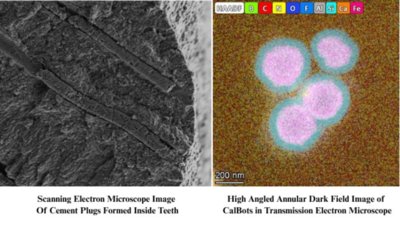
Bangalore, 2025 – In a world-first innovation, Indian Institute of Science (IISc) researchers and deep-tech startup Theranautilus have developed CalBots – microscopic magnetic robots that actively seek and seal exposed dentinal tubules, revolutionizing treatment for 1.5 billion people suffering from tooth sensitivity globally.
🔬 How CalBots Work
1️⃣ Guided Navigation
- 200nm-sized bots steered by external magnetic fields to precisely target tubules
- 10x more accurate than traditional desensitizing gels
2️⃣ Smart Sealing
- Carry biocompatible mineral nanocapsules (hydroxyapatite/fluoride)
- Release payload only on contact with dentin (pH-triggered)
3️⃣ Self-Destruct
- Dissolve into harmless ions after treatment
💡 Why This Disrupts Dentistry
| Parameter | Conventional Treatment | CalBots |
|---|---|---|
| Effect Duration | 3-6 months | 2+ years |
| Procedure Time | 15-20 min | 5 min |
| Tubule Coverage | 30-40% | >95% |
| Side Effects | Gum irritation | None |
🛠️ Development Journey
- 2019: IISc’s proof-of-concept (Science Robotics paper)
- 2022: Theranautilus spin-off (backed by C-CAMP & DBT)
- 2024: Completed large-animal trials (92% success rate)
🌍 Market Potential
- $18B global desensitizing products market
- Targets both clinics (in-office procedure) and OTC (future home kit version)
📅 Commercialization Path
- 2025: Seek CDSCO approval for human trials
- 2026: Partner with Dental chains (Clove Dental interested)
- 2027: Launch “Painless Pro” professional system ($5K/unit)
🧠 Expert Insight:
“This is microrobotics’ first practical application in dentistry – the start of a precision oral care revolution.”
—Dr. Debayan Dasgupta, Theranautilus CTO
📢 Would you volunteer for nanobot dental treatment?
#MedTech #Dentistry #Nanobots #IISc #DeepTech #HealthcareInnovation

